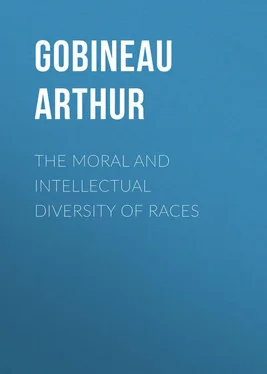Arthur Gobineau - The Moral and Intellectual Diversity of Races
Здесь есть возможность читать онлайн «Arthur Gobineau - The Moral and Intellectual Diversity of Races» — ознакомительный отрывок электронной книги совершенно бесплатно, а после прочтения отрывка купить полную версию. В некоторых случаях можно слушать аудио, скачать через торрент в формате fb2 и присутствует краткое содержание. Жанр: История, foreign_antique, foreign_prose, на английском языке. Описание произведения, (предисловие) а так же отзывы посетителей доступны на портале библиотеки ЛибКат.
- Название:The Moral and Intellectual Diversity of Races
- Автор:
- Жанр:
- Год:неизвестен
- ISBN:нет данных
- Рейтинг книги:4 / 5. Голосов: 1
-
Избранное:Добавить в избранное
- Отзывы:
-
Ваша оценка:
- 80
- 1
- 2
- 3
- 4
- 5
The Moral and Intellectual Diversity of Races: краткое содержание, описание и аннотация
Предлагаем к чтению аннотацию, описание, краткое содержание или предисловие (зависит от того, что написал сам автор книги «The Moral and Intellectual Diversity of Races»). Если вы не нашли необходимую информацию о книге — напишите в комментариях, мы постараемся отыскать её.
The Moral and Intellectual Diversity of Races — читать онлайн ознакомительный отрывок
Ниже представлен текст книги, разбитый по страницам. Система сохранения места последней прочитанной страницы, позволяет с удобством читать онлайн бесплатно книгу «The Moral and Intellectual Diversity of Races», без необходимости каждый раз заново искать на чём Вы остановились. Поставьте закладку, и сможете в любой момент перейти на страницу, на которой закончили чтение.
Интервал:
Закладка:
Wherever we see an hereditary aristocracy (whether called class or caste), it will be found to originate in a race, which, if no longer dominant , was once conqueror. Before the Norman conquest, the English aristocracy was Saxon , there were no nobles of the ancient British blood, east of Wales; after the conquest, the aristocracy was Norman , and nine-tenths of the noble families of England to this day trace, or pretend to trace, their origin to that stock. The noble French families, anterior to the Revolution, were almost all of Frankish or Burgundian origin. The same observation applies everywhere else. In support of my opinion, I have Niebuhr's great authority: "Wherever there are castes, they are the consequence of foreign conquest and subjugation; it is impossible for a nation to submit to such a system, unless it be compelled by the calamities of a conquest. By this means only it is, that, contrary to the will of a people, circumstances arise which afterwards assume the character of a division into classes or castes." — Lect. on Anc. Hist. (In the English translation, this passage occurs in vol. i. p. 90.)
In conclusion, I would observe that, whenever it becomes politic to flatter the mass of the people, the fact of conquest is denied. Thus, English writers labored hard to prove that William the Norman did not, in reality, conquer the Saxons. Some time before the French Revolution, the same was attempted to be proved in the case of the Germanic tribes in France. L'Abbé du Bos, and other writers, taxed their ingenuity to disguise an obvious fact, and to hide the truth under a pile of ponderous volumes. – H.
55
"It has been a favorite thesis with many writers, to pretend that the Saxon government was, at the time of the conquest, by no means subverted; that William of Normandy legally acceded to the throne, and, consequently, to the engagements of the Saxon kings… But, if we consider that the manner in which the public power is formed in a state, is so very essential a part of its government, and that a thorough change in this respect was introduced into England by the conquest, we shall not scruple to allow that a new government was established. Nay, as almost the whole landed property in the kingdom was, at that time, transferred to other hands, a new system of criminal justice introduced, and the language of the law moreover altered, the revolution may be said to have been such as is not, perhaps, to be paralleled in the history of any other country." – De Lolme's English Constitution , c. i., note c. – "The battle of Hastings, and the events which followed it, not only placed a Duke of Normandy on the English throne, but gave up the whole population of England to the tyranny of the Norman race. The subjugation of a nation has seldom, even in Asia, been more complete." – Macaulay's History of England , vol. i. p. 10. – H.
56
This assertion seems self-evident; it may, however, be not altogether irrelevant to the subject, to direct attention to a few facts in illustration of it. Great national calamities like wars, proscriptions, and revolutions, are like thunderbolts, striking mostly the objects of greatest elevation. We have seen that a conquering race generally, for a long time even after the conquest has been forgotten, forms an aristocracy, which generally monopolizes the prominent positions. In great political convulsions, this aristocracy suffers most, often in numbers, and always in proportion. Thus, at the battle of Cannæ, from 5,000 to 6,000 Roman knights are said to have been slain, and, at all times, the officer's dress has furnished the most conspicuous, and at the same time the most important target for the death-dealing stroke. In those fearful proscriptions, in which Sylla and Marius vied with each other in wholesale slaughter, the number of victims included two hundred senators and thirty-three ex-consuls. That the major part of the rest were prominent men, and therefore patricians, is obvious from the nature of this persecution. Revolutions are most often, though not always, produced by a fermentation among the mass of the population, who have a heavy score to settle against a class that has domineered and tyrannized over them. Their fury, therefore, is directed against this aristocracy. I have now before me a curious document (first published in the Prussian State-Gazette , in 1828, and for which I am indebted to a little German volume, Das Menschengeschlecht auf seinem Gegenwärtigen Standpuncte , by Smidt-Phiseldeck), giving a list of the victims that fell under the guillotine by sentence of the revolutionary tribunal, from August, 1792, to the 27th of July, 1794, in a little less than two years. The number of victims there given is 2,774. Of these, 941 are of rank unknown. The remaining 1,833 may be divided in the following proportions: —

Such facts require no comments. – H.
57
• The recent insurrection in China has given rise to a great deal of speculation, and various are the opinions that have been formed respecting it. But it is now pretty generally conceded that it is a great national movement, and, therefore, must ultimately be successful. The history of this insurrection, by Mr. Callery and Dr. Ivan (one the interpreter, and the other the physician of the French embassy in China, and both well known and reliable authorities) leaves no doubt upon the subject. One of the most significant signs in this movement is the cutting off the tails, and letting the hair grow, which is being practised, says Dr. Ivan, in all the great cities, and in the very teeth of the mandarins. ( Ins. in China , p. 243.) Let not the reader smile at this seemingly puerile demonstration, or underrate its importance. Apparently trivial occurrences are often the harbingers of the most important events. Were I to see in the streets of Berlin or Vienna, men with long beards or hats of a certain shape, I should know that serious troubles are to be expected; and in proportion to the number of such men, I should consider the catastrophe more or less near at hand, and the monarch's crown in danger. When the Lombard stops smoking in the streets, he meditates a revolution; and France is comparatively safe, even though every street in Paris is barricaded, and blood flows in torrents; but when bands march through the streets singing the ça ira , we know that to-morrow the Red Republic will be proclaimed. All these are silent, but expressive demonstrations of the prevalence of a certain principle among the masses. Such a one is the cutting off of the tail among the Chinese. Nor is this a mere emblem. The shaved crown and the tail are the brands of conquest, a mark of degradation imposed by the Mantchoos on the subjugated race. The Chinese have never abandoned the hope of one day expelling their conquerors, as they did already once before. "Ever since the fall of the Mings," says Dr. Ivan, "and the accession of the Mantchoo dynasty, clandestine associations – these intellectual laboratories of declining states – have been incessantly in operation. The most celebrated of these secret societies, that of the Triad, or the three principles , commands so extensive and powerful an organization, that its members may be found throughout China, and wherever the Chinese emigrate; so that there is no great exaggeration in the Chinese saying: 'When three of us are together, the Triad is among us.'" ( Hist. of the Insur. in Ch. , p. 112.) Again, the writer says: "The revolutionary impetus is now so strong, the affairs of the pretender or chief of the insurrection in so prosperous a condition, that the success of his cause has nothing to fear from the loss of a battle. It would require a series of unprecedented reverses to ruin his hopes" (p. 243 and 245).
Читать дальшеИнтервал:
Закладка:
Похожие книги на «The Moral and Intellectual Diversity of Races»
Представляем Вашему вниманию похожие книги на «The Moral and Intellectual Diversity of Races» списком для выбора. Мы отобрали схожую по названию и смыслу литературу в надежде предоставить читателям больше вариантов отыскать новые, интересные, ещё непрочитанные произведения.
Обсуждение, отзывы о книге «The Moral and Intellectual Diversity of Races» и просто собственные мнения читателей. Оставьте ваши комментарии, напишите, что Вы думаете о произведении, его смысле или главных героях. Укажите что конкретно понравилось, а что нет, и почему Вы так считаете.












